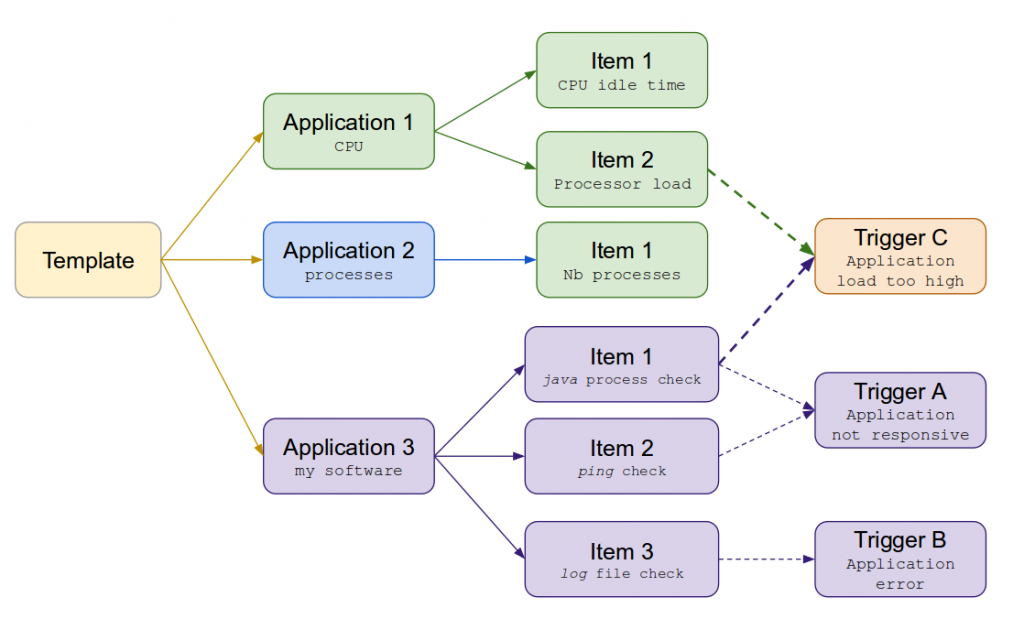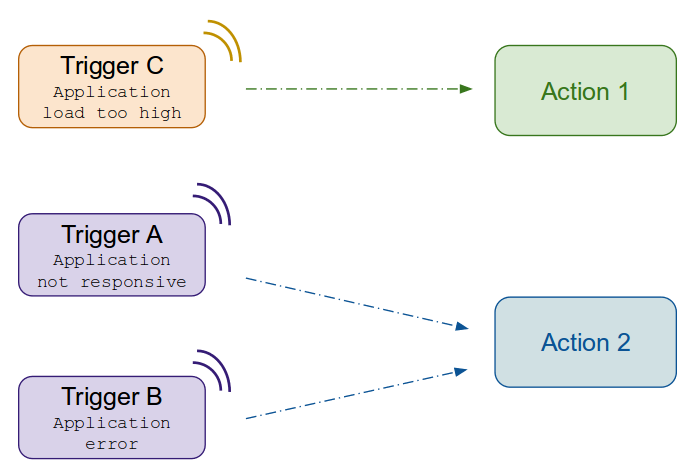Difference between revisions of "Zabbix create template"
| Line 10: | Line 10: | ||
[[File:ZabbixPrinciple_01.png|1024px|caption|Zabbix template principle]] | [[File:ZabbixPrinciple_01.png|1024px|caption|Zabbix template principle]] | ||
| − | # A '''template''' is a set of applications, items | + | # A '''template''' is a set of applications, items and triggers |
# Each ''template'' has a list of '''applications'''. An ''application'' is either a specific type of data or a dedicated software. | # Each ''template'' has a list of '''applications'''. An ''application'' is either a specific type of data or a dedicated software. | ||
# Each ''application'' has a set of '''items'''. An ''item'' is bound to a specific property or event of the application. | # Each ''application'' has a set of '''items'''. An ''item'' is bound to a specific property or event of the application. | ||
| Line 17: | Line 17: | ||
→ A trigger can be bound to items that belong to different applications. | → A trigger can be bound to items that belong to different applications. | ||
| − | Example | + | Example: item X occured 3 times in less than 10mn, and item Y occured within last 5 mn. |
When all the trigger's conditions are meet it will: | When all the trigger's conditions are meet it will: | ||
* Create a specific Zabbix event | * Create a specific Zabbix event | ||
| − | * Set an alarm level. Alarm will | + | * Set an alarm level. Alarm will disappear automatically when conditions are back to normal |
| + | [[File:ZabbixPrinciple_02.png|1024px|caption|Zabbix action principle]] | ||
| + | # Each '''action''' is bound to some ''trigger(s)''. | ||
| + | # An ''action'' will take decision when its conditions are meet. It can: | ||
| + | ** Run command on remote host (kill application, reboot, etc.) | ||
| + | ** Send emails and alert users | ||
| − | # Each '''host''' belongs to one or more '''groups'''. Each ''group'' has some | + | |
| + | # Each '''host''' belongs to one or more '''groups'''. | ||
| + | # Each ''host group'' has some ''templates'' they apply to their ''hosts'' | ||
Revision as of 10:52, 25 June 2015
Vocable
Key points:
Zabbix configuration rely on templates. This is the monitoring principle:
- A template is a set of applications, items and triggers
- Each template has a list of applications. An application is either a specific type of data or a dedicated software.
- Each application has a set of items. An item is bound to a specific property or event of the application.
- Each item can be bound to one or many triggers
→ A trigger can be bound to items that belong to different applications.
Example: item X occured 3 times in less than 10mn, and item Y occured within last 5 mn.
When all the trigger's conditions are meet it will:
- Create a specific Zabbix event
- Set an alarm level. Alarm will disappear automatically when conditions are back to normal
- Each action is bound to some trigger(s).
- An action will take decision when its conditions are meet. It can:
- Run command on remote host (kill application, reboot, etc.)
- Send emails and alert users
- Each host belongs to one or more groups.
- Each host group has some templates they apply to their hosts
Access templates
→ Configuration menu >> Templates
Don't forget to choose the group of template you want to see.
Create new template
You can request a new template creation from the template menu:
→ Configuration menu >> Templates >> Create template
Then, you just have to fill up the forms:
- Tab 1 Template : Give a template a name. Template name = Visible name
- Tab 2 Linked templates : If you plan to use Linux then create a link to Template OS Linux. Otherwise, create a link to Zabbix agent.
- Tab 3 Macros : nothing to do over here !




